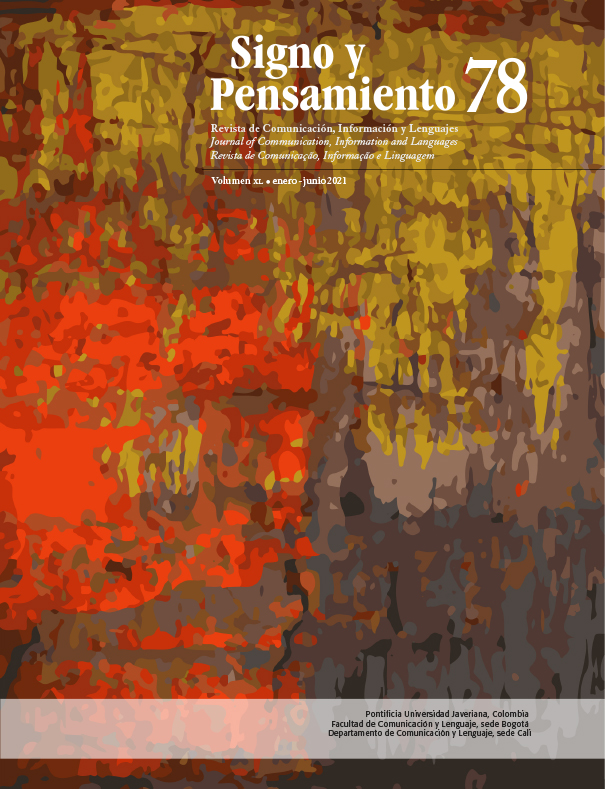Resumen
Este artículo muestra la importancia de la concepción pragmática del lenguaje propuesta por Wittgenstein, en relación con su filosofía de la acción, al igual que las posibilidades que ofrece a la teoría política para explicar el impacto y la influencia que tiene en algunos de sus lectores. Particularmente, esto es importante para la noción de representación política que emerge como una práctica lingüística de una regla basada en una acción, en términos de dar y pedir razones. Esta idea se reforzará por la reconstrucción de los argumentos de Wittgenstein aplicados a lo social; un trabajo que han realizado muchos lectores y comentadores, específicamente: Searle, Brandom y Mouffe. Tal instancia se verá limitada en este texto al hacer uso de la idea de Rawls de razones públicas, a través del lente del pragmatismo Wittgensteniano de lo socialmente dado. C
Acero, J., Bustos, E., & Quesada, D. (2001). Introducción a la filosofía del lenguaje. Cátedra.
Alexy, R. (2001). Theorie der juristischen Argumentation. Suhrkamp.
Apel, K. (1994). The Transcendental Conception of Language, Communication and the Idea of a First Philosophy: Towards a Critical Reconstruction of the History of Philosophy in the Light of Language Philosophy. En K. Apel, Selected Essays, Towards a Transcendental Semiotics (pp.. 83-111) V. 1. Humanities Press.
Bergman, G. (1964). Logic and reality. The University of Wisconsin Press.
Bourdieu, P. (1995). The Rules of Art. The Genesis and Structure of the Literary Field. (S. Emanuel, Trad.) Stanford University Press.
Brandom, R. (1994). Making It Explicit: Reasoning, Representing, and Discursive Commitment. Harvard University Press.
Brandom, R. (2001). Articulating Reasons. An introduction to inferentialism. Harvard University Press.
Dennett, D. C. (1971). Intentional systems. Journal of Philosophy, 68, 87-106. DOI https://doi.org/10.2307/2025382.
Fossen, T. (2014). Politicizing Brandom’s Pragmatism: Normativity and the Agonal Character of Social Practice. European Journal of Philosophy, 22(3), 371–395. https://doi.org/10.1111/j.1468-0378.2011.00504.x
Fossen, T. (2019). Constructivism and the Logic of Political Representation. American Political Science Review, 113(3), 824-837. doi:https://doi.org/10.1017/S0003055419000273
Habermas, J. (1999). Wahrheit und Rechtfertigung: Philosophische Aufsätze. Suhrkamp.
Heyes, C. (2003). The Grammar of Politics: Wittgenstein and Political Philosophy. Cornell University Press.
Kant, I. (1991). The Metaphysics of Morals. (M. Gregor, Trad.) Cambridge University Press.
Kripke, S. (1982). Wittgenstein on Rules and Private Language. Harvard University Press.
Laclau, E., & Mouffe, C. (2001). Hegemony and Socialist Strategy: Towards a Radical Democratic Politics. Verso.
Misak, C. (2016). Cambridge pragmatism. From Peirce and James to Ramsey and Wittgenstein. Oxford University Press.
Moore, G. E. (1983). Defensa del sentido común y otros ensayos. Orbis.
Mouffe, C. (2000). The democratic paradox. Verso.
Mouffe, C. (2011). En torno a lo político. Buenos Aires: Fondo de Cultura Económica.
Mouffe, C. (2014). Agonística. Pensar el mundo políticamente. Buenos Aires: Fondo de Cultura Económica.
Pogge, T. (2010). Is Kant's Rechtslehre Comprehensive? The Southern Journal of Philosophy, 36, 161-187. https://doi.org/10.1111/j.2041-6962.1998.tb01786.x
Ramírez-Vallejo, D. A. (2021). La construcción lingüística del Estado moderno: el concepto de democracia como una descripción abreviada de promesas por cumplir. Analecta Política, 11(20), 133 - 151. https://doi.org/10.18566/apolit.v11n20.a07
Rawls, J. (2001). Law of Peoples. Harvard University Press.
Rodríguez, A., & Ramírez-Vallejo, D. (2021). Wittgenstein y Searle: entre los juegos de lenguaje y los actos de habla. En F. Santamaría, N. Rosanía, & K. Cárdenas, Perspectivas Wittgensteinianas. Lenguaje, significado y acción (pp. 407-449). Tirant lo Blanc.
Rorty, R. (1992). The Linguistic Turn: Essays in Philosophical Method. The University of Chicago Press.
Rorty, R. (2007). Philosophy as Cultural Politics. Cambridge University Press.
Rorty, R. (2009). Philosophy and the Mirror of Nature. Princeton University Press.
Santamaría, F. (2016). Hacer mundos: el nombrar y la significatividad. Siglo del Hombre.
Santamaría, F., & Ruiz-Martínez, S. (2019). ¿Qué significa pertenecer a una comunidad? Disputatio, 1-27.
Searle, J. (1969). Speech Acts. An Essay in the Philosophy of Language. Cambridge University Press.
Searle, J. (1995). The Construction of Social Reality. The Free Press.
Searle, J. (2010). Making the Social World. The Structure of Human Civilization. Oxford University Press.
Sellars, W. (2005). Language, Rules and Behavior. En W. Sellars, & J. Sicha (Ed.), Pure Pragmatics and Possible Worlds (pp. 117-134). Ridgeview.
Skinner, Q. (2001). Vision of Politics (Vol. 1. Regarding the Method). Cambridge University Press.
Tully, J. (1989). Wittgenstein and Political Philosophy. Political Theory, 17(2), 172-204. https://www.jstor.org/stable/191248
Von Neumann, J., & Morgenstern, O. (1953). Theory of Games and Economic Behavior. Princeton University Press.
Williams, B. (2009). In the Beginning Was the Deed: Realism and Moralism in Political Argument. G. Hawthorn, Ed.- Princeton University Press.
Winch, P. (1958). The Idea of Social Science. Routledge.
Wittgenstein, L. (1969). On Certainty. (G. Anscombe, G. von Wright, Edits., D. Paul, & G. Anscombe, Trads.) Basil Blackwell.
Wittgenstein, L. (2009). Philosophical Investigations. (P. Hacker, J. Schulte, Edits., G. Anscombe, P. Hacker, & J. Schulte, Trads.) Wiley.

Esta obra está bajo una licencia internacional Creative Commons Atribución 4.0.
Derechos de autor 2021 Freddy Santamaría Velasco


